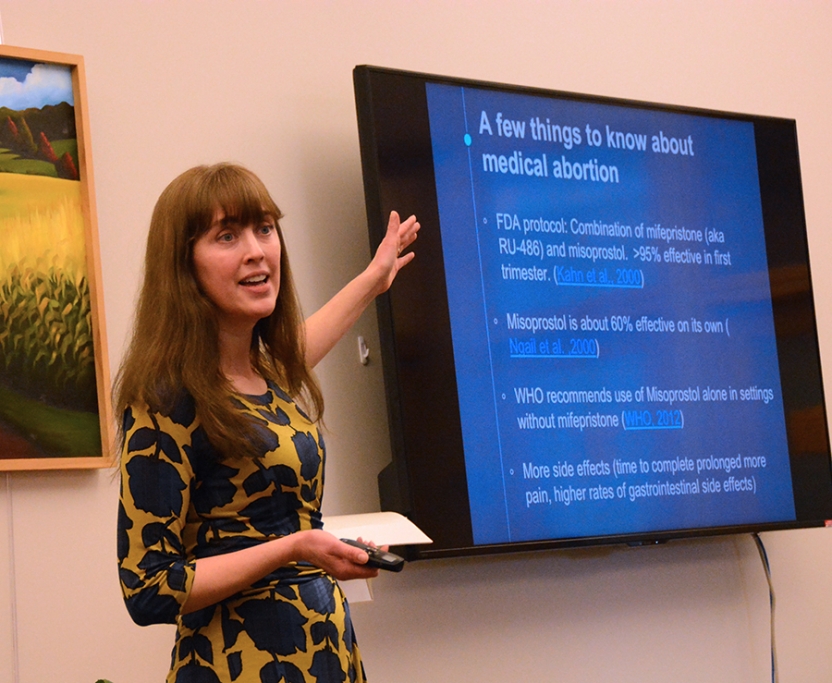Middlebury Economist Studies the Effects of Abortion Policy in Texas

MIDDLEBURY, Vt. – A Middlebury College associate professor who studies the social and economic effects of policies governing women’s access to abortion presented recent findings at a “Behind the Scenes” lecture at the Davis Family Library on January 25.
Caitlin M.K. Myers, an applied micro economist, is one of Middlebury’s Digital Liberal Arts (DLA) faculty fellows – professors who explore the power of technology to enhance and transform their scholarship, through a grant from the Andrew W. Mellon Foundation.
Myers’ presentation was titled “Desperate Measures: Visualizing the Effects of Abortion Clinic Closures in Texas,” and she focused the majority of her talk on the effects of Texas House Bill 2, the 2013 law that says all abortion providers in the state must have admitting privileges at an emergency room within 30 miles of the clinic, and that all clinics must be licensed as ambulatory surgical centers.
Twenty-three Texas abortion clinics closed the day after the bill was signed into law, Myers said. The law, which applied to medical abortions (such as those that use abortifacient pharmaceutical drugs) as well as surgical abortions, made it more difficult for women to receive legal abortions in Texas by making clinics less accessible, increasing women’s travel time and costs, and increasing the waiting time for a procedure at the remaining clinics, she said.
“I am interested in what burden is imposed by increasing regulations on abortions, and the word ‘burden’ is a loaded word here because the Supreme Court standard for evaluating abortion regulations is that the state must have a legitimate interest in the legislation and that it must impose an undue burden on women seeking abortions.”
Myers continued, “Repeatedly you hear judges, attorneys, and journalists bemoaning the fact that the question here is whether these laws impose an undue burden, and there is almost no empirical evidence on what is the effect of these laws. There is anecdotal evidence of women having a hard time finding a provider, traveling ridiculous distances, or saying they are desperate and doing this or that. But there is no really good hard and fast empirical evidence, so there is a need for it.”
The professor’s ongoing research, assisted by undergraduates Birgitta Cheng ‘17 and Anna Cerf ‘18, is producing data tables and dynamic maps that visualize the effects of abortion clinic closures in Texas.
With assistance from Cheng, Myers demonstrated her dynamic maps for the audience of about 25 students, staff, and faculty colleagues gathered in the offices of the Center for Teaching, Learning and Research.
Visualizations, such as her map showing the change in distance to the nearest abortion clinic for all of Texas between the years 2010 and 2015, can be effective in shaping public policy, she said.
“If you are not an applied stats person you might look at a [data] table and say ‘please move on.’ So when I started to look at the effects of modern abortion policy, I knew right away that my empirical research design would not be accessible to lay people or policy makers, and I needed it to be accessible to a broader audience.
“That’s when I asked the Digital Liberal Arts [initiative] to fund my project and make this type of research design more widely accessible” so the public can clearly see how decreasing access to abortion in Texas is limiting options for women and impacting their health, she added.

